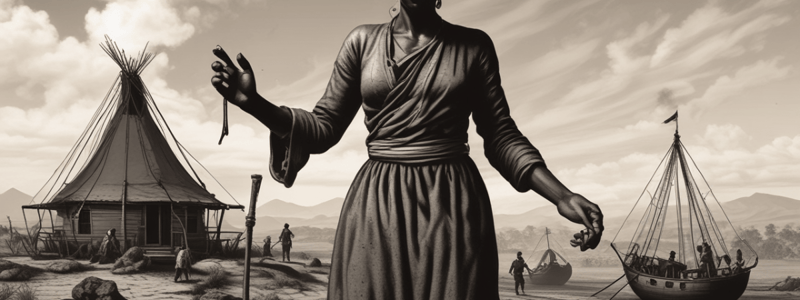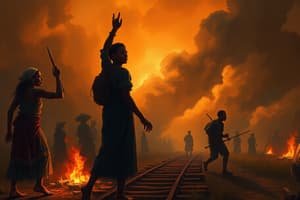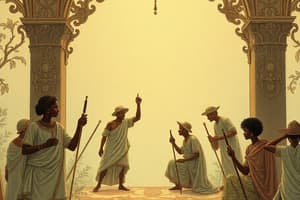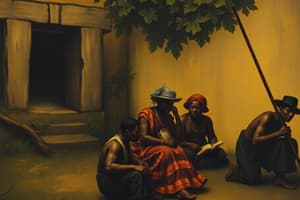Podcast
Questions and Answers
What was the dominant form of resistance in the Virgin Islands?
What was the dominant form of resistance in the Virgin Islands?
- Revolt
- Maritime marronage (correct)
- Burning down of the plantation
- Murdering of Europeans
Why could successful maroon societies or settlements exist and survive?
Why could successful maroon societies or settlements exist and survive?
- Because they were near cities
- Because they were often almost inaccessible (correct)
- Because they were accessible
- Because they were near plantations
What skills did individuals who ran away to join maroon societies need to develop?
What skills did individuals who ran away to join maroon societies need to develop?
- Sailing skills
- Defense skills in guerilla warfare (correct)
- Farming skills
- Cooking skills
Why did maritime marronage become the dominant form of resistance in the Virgin Islands?
Why did maritime marronage become the dominant form of resistance in the Virgin Islands?
How did enslaved individuals in the Virgin Islands become familiar with the surrounding waters?
How did enslaved individuals in the Virgin Islands become familiar with the surrounding waters?
What did enslaved individuals secretly build to facilitate their escape?
What did enslaved individuals secretly build to facilitate their escape?
What did planters do to limit the problems of runaway persons in Road Town?
What did planters do to limit the problems of runaway persons in Road Town?
What was the punishment for enslaved persons circulating the public streets after 9 p.m. without written permission from their owners?
What was the punishment for enslaved persons circulating the public streets after 9 p.m. without written permission from their owners?
What was the primary means of maintaining control in enslaved societies?
What was the primary means of maintaining control in enslaved societies?
What was the consequence for enslaved persons who were found to be in possession of guns and other weapons?
What was the consequence for enslaved persons who were found to be in possession of guns and other weapons?
Which of the following was NOT a form of passive resistance?
Which of the following was NOT a form of passive resistance?
What was the primary purpose of the enslaved code of 1783?
What was the primary purpose of the enslaved code of 1783?
What was the consequence for enslaved persons who informed on conspirators?
What was the consequence for enslaved persons who informed on conspirators?
What was the primary difference between active and passive resistance?
What was the primary difference between active and passive resistance?
What was the primary reason planters feared being poisoned by their cooks?
What was the primary reason planters feared being poisoned by their cooks?
What was the term used to describe the act of running away from enslavement?
What was the term used to describe the act of running away from enslavement?
Flashcards are hidden until you start studying
Study Notes
Resistance to Enslavement
- Enslavement was held together by the use or threat of violence as punishment, making violence inherent to enslaved societies.
- The Virgin Islands' enslaved code of 1783 prohibited unauthorized movement, congregation, possession of guns and weapons, and secret rituals.
Types of Resistance
- Passive resistance: using nonviolent methods, e.g., poisoning, damaging equipment, slowdown of work, and mutilation.
- Active resistance: using deliberate actions, sometimes violent, to bring about change, e.g., burning down plantations, revolt, and murdering Europeans.
Marronage
- Marronage: running away and joining maroon societies, often in inaccessible areas like jungles, swamps, and mountains.
- In the Virgin Islands, marronage took the form of maritime marronage, where enslaved individuals used boats to escape to Puerto Rico.
Maritime Marronage in the Virgin Islands
- Enslaved individuals used boats to escape, often building canoes or forcing sailors to take them to Puerto Rico.
- This form of resistance created problems for planters, who sent petitions to London regarding the issue.
- Planters attempted to limit the problem by having guards patrol at night and imprisoning enslaved persons without permission after 9 p.m.
- An Act of 1787 mandated the presence of a European watchman on every fishing boat or cable.
Studying That Suits You
Use AI to generate personalized quizzes and flashcards to suit your learning preferences.



